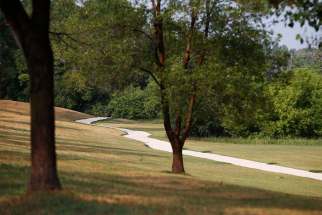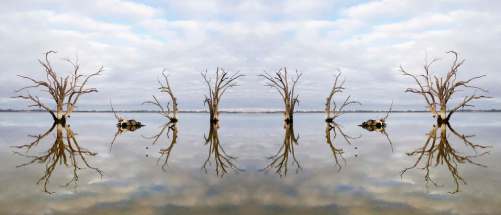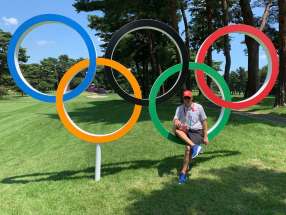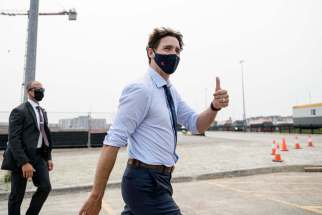Risky election call as pandemic persists
Read this article for free:
or
Already have an account? Log in here »
To continue reading, please subscribe:
Monthly Digital Subscription
$0 for the first 4 weeks*
- Enjoy unlimited reading on winnipegfreepress.com
- Read the E-Edition, our digital replica newspaper
- Access News Break, our award-winning app
- Play interactive puzzles
*No charge for 4 weeks then price increases to the regular rate of $19.00 plus GST every four weeks. Offer available to new and qualified returning subscribers only. Cancel any time.
Monthly Digital Subscription
$4.75/week*
- Enjoy unlimited reading on winnipegfreepress.com
- Read the E-Edition, our digital replica newspaper
- Access News Break, our award-winning app
- Play interactive puzzles
*Billed as $19 plus GST every four weeks. Cancel any time.
To continue reading, please subscribe:
Add Free Press access to your Brandon Sun subscription for only an additional
$1 for the first 4 weeks*
*Your next subscription payment will increase by $1.00 and you will be charged $16.99 plus GST for four weeks. After four weeks, your payment will increase to $23.99 plus GST every four weeks.
Read unlimited articles for free today:
or
Already have an account? Log in here »
Hey there, time traveller!
This article was published 13/08/2021 (1582 days ago), so information in it may no longer be current.
If it all goes as expected, this is the weekend Prime Minister Justin Trudeau will call a federal election in a bid to turn his current minority mandate into a majority. But do Canadians really want an election on Sept. 20, as current predictions indicate?
And, perhaps more importantly, is an election more than two years in advance of the normally prescribed (2023) date something Canadians need?
Going into this pivotal weekend, public opinion was inconclusive. Although the Liberals have a comfortable lead in most public opinion polls — enough that a majority may be within reach — support for an election is less robust.
A poll by Mainstreet Research suggests the only region of the country that really wants an election is the Prairies, where Conservative support, and an appetite to punish the Liberals, runs highest. On the other hand, an Abacus poll showed eight out of 10 respondents would not be sufficiently upset about an election to take it out on Mr. Trudeau.
Support for snap elections tends to be lowest beforehand; once an election is called, voters tend to put aside concerns about timing to focus on the issues at hand. In most instances, that is.
Liberal leader John Turner lost a snap election to rookie Progressive Conservative leader Brian Mulroney in 1984. Ontario Liberal premier David Peterson’s snap-election miscalculation in 1990 catapuled Bob Rae’s NDP to power. And in 2015, then-Alberta PC premier Jim Prentice called an election nobody wanted, allowing Rachel Notley and the NDP to capture perhaps the most surprising provincial election win in modern Canadian history.
Not all snap elections backfire, however. Manitoba Premier Brian Pallister made a very surprising election call in 2019 and managed to hang on to his majority mandate.
Who or what will determine the outcome of Mr. Trudeau’s earlier-than-required election? The result will depend largely on whether the opposition parties present any real alternatives. At present, that remains unclear.
Erin O’Toole’s leadership of the federal Conservative Party is a hot mess. He seems virtually unable to do or say anything that is not dismissed by critics and immediately set upon by members his own party.
The federal NDP has the benefit of arguably (or so some polls have told us) the most respected leader in the country, Jagmeet Singh. However, notwithstanding Liberal scuffles and Tory discord, the NDP has — once again — been unable to translate disapproval for the two main parties into significant additional support.
Whatever his rationale, the Liberal leader owes it to Canadians to explain why, in the looming shadow of a fourth pandemic wave, he is subjecting us to the stress, bother and expense of a snap federal election rather than following the usual cycle and waiting until 2023.
So, is Mr. Trudeau calling this election now because he is convinced the opposition cannot present a legitimate alternative to the Liberals, warts and all? The answer is probably that, as well as support for the Liberals’ pandemic response.
Whatever his rationale, the Liberal leader owes it to Canadians to explain why, in the looming shadow of a fourth pandemic wave, he is subjecting us to the stress, bother and expense of a snap federal election rather than following the usual cycle and waiting until 2023.
Mr. Trudeau’s government has done a capable job at the helm of the national pandemic response, particularly when it comes to vaccines. Federal procurement has put us in the enviable position of being one of the most vaccinated nations on Earth. Liberals also support such measures as a vaccine passport for international travel, an idea that is likely to resonate with voters.
Is all that enough to overcome the inherent cynicism of holding an election now?
With current polling so inconclusive, it seems we’ll have to wait until Sept. 20 to learn whether Mr. Trudeau’s snap decision was a good idea.








